Newsletter No.63
Dear Members:


28th October 2009 was very significant to all of us, as we celebrated the 50th Anniversary of AOTs in commemorating the foundation of the Association and in conjunction with AOTS Alumni Society (AAS) 8th Convention in Yokohama. It was without doubt a great experience for me as the President of the Malaysian chapter for being able to lead our team of 13 delegates to meet some of the leading Alumni delegates worldwide.
During the Convention, I was privileged to chair and shared information with some of the group meetings of more than 300 delegates from over 42 countries. It was an honor for me to be one of the eight member team who drafted the Yokohama Resolution 2009. It was truly a memorable experience for me having such opportunity to gain better understanding of AOTS.
On a lighter note, during my stay in Yokohama I took the apportunity to visit Izu province which is 120km south of Tokyo, renown for its beautiful coastal scenery and hot-spring resorts. One of the stunning spots is Mount Omura. It is a unique site largely resembling a huge mound of grass with crater. There is a motorized chair-lift taking you up the mountain top for a 360 degrees view. On a clear weather you can see the Izu Seven Islands, Jogasaki, Hakone, Mount Fuji, the Amagi mountain range. The resort city Izu is a very popular with Tokyoites on weekends and holidays.
Some other known tourist spots that we had visited were Tokyo City, Asakusa, the Imperial Palace, Hakone and the ever busy and bustling Ginza. It was truly a trip that I will always treasure.
Back on the home ground, I believe many of the readers would have observed that on 1st November 2009, our recent School Project on Kaizen was given wide coverage in our national newspaper, The New Straits Times (see page 5) The write-up was a 2-full page. Coincidentally, on the same day there was also a similar write up in Japan in their International Development Journal.
My sincere appreciation to all those who had contributed and extended their support in making the school project a success.
The year is fast ending, 2010 will be a more challenging year and I wish all of you the best of luck and perseverance in your undertakings.
Wishing all members and readers a Merry Christmas and Happy New Year 2010.
President
CL Yang . PJM
Ever since its inception in 1959, AOTS has been providing training for industrial human resources of developing countries to structure a rich and peaceful world so that all people of the globe may continuously benefit from the development of the economy. At the end of fiscal 2008, the total number of participants trained in Japan has reached more than 149,000. Many of the trainee whohad undergone training in Japan are now actively contributing to the industrial development of their home countries.
28th October 2009 was very significant for AOTS and all the Alumni worldwide as we celebrated the 50th Anniversary of AOTS. This celebration was shared with all the AOTS Alumni Societies when they met at the AAS 8th Convention in Yokohama.
It was without doubt a great experience for me as the President of PAAM and for being able to lead our 13 member delegates to attend this memorable event.
The Convention started off with an international symposium at the Tokyo International Forum. Later the Convention proper was held in Yokohama Kenshu Center where more than 300 delegates representatives from 42 countries worldwide attended. Delegates from all participating countries were put in groupings to address various pressing issues affecting their activities.
During the Convention I had the privilege to chair one of the group meeting. I was also honored to be one of the eight appointed AAS representatives to draft the Yokohama Resolution 2009.
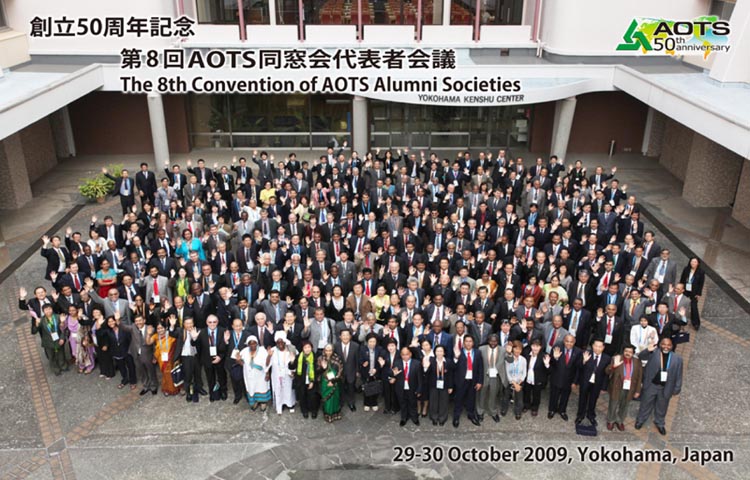
Group photograph of all Convention Representatives/delegates & staff.
GET TO KNOW
Your Central Committee Members

Name : Maggie Yap Cheng Hong
Background
Ms. Maggie Yap Cheng Hong has been a member of PAAM Central Committee since 2006. A Qualified Secretary. She is now pursuing a Professional Diploma in Nutritional Medicine. She is very competent in Japanese having completed the Advanced Level Course with PAAM.
Career
Ms. Maggie is now attached with an MNC based in Petaling Jaya. Her future aspiration is to achieve Japanese Language Proficiency Level 1. She hopes to travel the whole of Japan by year 2012.
Recorded by Mr. Tan TE
The 8th AOTS Convention was held in Yokohama Kenshu Center from 28 to 30 October 2009. PAAM was represented by a delegation of 10 persons i.e. Representative: Mr. Yang Chor Leong and delegates: Mr .Lim Eng Swee, Mr. Tan Teng EK, Mr. Yap Choon Ming, Ms. Maggie Yap, En. A. Aziz Y. Kamaruddin, Mr. Eng Soi Tee, Mr. Victor Hii, Mr. Liaw Moo Thian & Mr. Hsiung Kwo Fang.
The 3 days convention was attended by more than 300 representatives and delegates from 42 countries. It ended with the following resolutions adopted for the next 4 years.
Commemorating the 50th Anniversary of the foundation of the Association for Overseas Technical Scholarship, we 211 delegates of 68 Alumni Associations of AOTS (hereafter AASs) from 42 countries assembled to the 8th Convention of AOTS Alumni Societies at Yokohama from 29th to 30th October 2009. After a series of discussion and exchange of opinions we came to following resolutions:
With consideration of fast changing global environment, and more specifically recognizing AASs and AOTS facing challenge of sustainable growth toward the future, we envision our imminent tasks as follows:
We are in need to nurture new energy and innovative generation of AAS leaders.
We recognize more need to share information amongst AASs
We aim to achieve sustainability and self sufficiency for all AASs
We need to widen cooperation amongst AASs
We aspire to encourage more collaborative business opportunities
We wish to keep us informed of activities of World Network of Friendship (WNF)
We need to compile AAS database
We endorse and support AOTS Environmental Policy
We aim to achieve sustainability and self sufficiency for all AASs
We need to widen cooperation amongst AASs
We aspire to encourage more collaborative business opportunities
We wish to keep us informed of activities of World Network of Friendship (WNF)
We need to compile AAS database
We endorse and support AOTS Environmental Policy
We need to widen cooperation amongst AASs
We aspire to encourage more collaborative business opportunities
We wish to keep us inform of activities of World Network of Friendship (WNF)
We need to compile AAS database
We endorse and support AOTS Environmental Policy
More specifically we propose agenda of the following action plans:
Topics of trainings
(1) AAS requests AOTS to review, revive, and redesign the present training programs to fulfill the specific needs of the specific AAS.
(2) AAS requests AOTS to initiate articulating the training programs for newer topics such as environmental, energy sector, service sectors, and agricultural sectors.
(3) AAS strongly requests AOTS to revive the technical training programs.
(4) AAS to be encourages to organize Japanese language courses.
Website, Data Management
(1) All AAS are requested to develop their own website.
(2) AAS requests AOTS to provide regular update of members participating in training courses preferably on a quarterly basis.
(3) AAS requests AOTS to support AAS to grow partnerships with local Japanese organizations providing data about AOTS activities via embassies, JETRO and other organizations.
(4) Develop an expert database including silver volunteers.
(5) Include the silver volunteers/ experts in the Online AOTS Yellow Page.
(6) Each AAS will be recommended to register to use the “Facebook” with informational support from AOTS.
Departure from Dependency on AOTS to Interdependency
(1) Each AAS should develop a business plan to survive financially.
(2) Encourage sponsorship for various activities conducted by AAS.
(3) All the regional federations need to be more active in promoting the AAS activities to other AAS.
(4) AAS to facilitate business delegations to benchmark best practices in Japanese organizations.
(5) To develop all AAS into a Center of Excellence and recognize the best practices by awarding.
(6) AAS to submit proposal for reviewing territorial responsibilities.
(7) Services of regional experts to be processed through respective AAS / Federations.
Optimization / Cost Reduction
Review non-value added activities across the board
It was proposed that the 9th AAS Convention would be held in Kuala Lumpur, Malaysia.
As can be seen in the resolutions, the last resolutions proposed to give
PAAM the honor of hosting the next AOTS Convention in Kuala Lumpur in 2013.
Most people do not take Fire Protection seriously, thinking that it does not happen to them. This Home Fire Prevention tea talk hoped to create an awareness of fire hazards among the audience and equip them with fire fighting skills, should such incidence occurs.
There are 3 components that produce fire. 1) Heat, 2) Fuel & 3) Oxygen. We call this “Fire Triangle”. The absence of any one component will not produce ‘Fire’.
Once all the 3 components are present a fire will occur, producing ‘Toxic smoke’ and ‘Heat’. 98% of the fatalities are caused by the inhalation of toxic smoke before being burnt. Always remember “Fire Kills in minutes & smoke kills in seconds”. It takes less than 3 minutes for the fire to reach ‘flash over’ which means the situation is out of control.
8 important things to remember to minimize fire hazards:
| 1 | Do you have reliable escape plan? Every home should have escape plan. Make sure everyone in the family knows of two ways out of each room in the house. This is because if one exit route is blocked, you have a back up plan. Also agree on evacuate the house. |
| 2 | Can you find your key? Fix emergency break glass key box at all exit doors and windows. During emergency just break the glass, take out the key and unlock the door. Easy access to the keys will save you precious time. |
| 3 | Window grill Do not fully grill your window. Fix one window panel with grill and the grilled panel that opens may be pad-locked. If room door is blocked you can escape through the window. |
| 4 | Smoke Detector Do you know that once you are asleep, you can hear but unable to smell? Smoke detectors will sound when they detect smoke. It is important to have smoke detectors installed on each floor of your home. Remember to check them regularly for proper functioning and change their battery at least once a year. |
| 5 | Fire Blanket Ideally have a Fire Blanket at your kitchen. If there is an oil fire, turn off the gas, cover the Fire blanket over the pot or pan and leave it to cool. If you do not have Fire Blanket, cover the kitchen fire with the pot or pan lid. Do not take the lid out of the pot when is still hot. It will reignite again when you open the lid. Never pour water onto oil fire. It will develop 10 to 20 time bigger fire and you risk getting hurt from the fire or the steam. |
| 6 | Fire Extinguisher Have at least a portable Fire Extinguisher (4kg ABC powder type) at home. You can put out most types of fire with ABC powder Fire Extinguisher. Class A are for ordinary combustible materials such as paper, wood, cardboard and most plastics. Class B fires involve flammable or combustible liquids such as gasoline, kerosene, grease and oil. Class C fires involve electrical equipment such as appliances wiring circuit breakers and outlets. Never use water to extinguish class C fires – the risk of electrical shock is far too great! |
| 7 | Using Fire Extinguisher Use the P.A.S.S. technique Pull the pin Aim at the base of the fire Squeeze the lever slowly Sweep from side to side |
| 8 | What you should do if your clothes catch fire If your clothes catch ‘Fire’. STOP, DROP and ROLL, you will put out the flames. Make sure you cover your face with both hands and roll again and again until the flames are out. |
 The Local emergency no.999 |  Essential firefighting equipment were put on display and Mr Khor demonstrated the correct application. |
In the West it is common to “go Dutch” at a restaurant or coffee shop, with each person paying for his or her own order. In Japan, it is more common for one person to pick the tab, even in situations that are not particularly formal. Unless it is clear who is the host and who is the guest, the senior member of the group is usually expected to pay, or in the case of those who often go out together, to take turns. But there are many cases of those who often go out together, to take turns. But there are many times when it is hard to determine just what is the right procedure, often resulting in a somewhat comical battle over the bill at the cash register as everyone at least put up a show of attempting to pay.
Situations when everyone is expected to pay their own way include very informal situation, especially among young people, and invitations for which there has been a prior verbal agreement to split the tab (warikan).
There is no other way to learn these customs than to try to be sensitive from the start. If you and your Japanese partner occasionally meet outside. You may find that your partner keeps offering to pick up the tab. Be sure to take turns, and also to discuss it at some point. In any case, you will have to learn in time how to judge how strongly to object when you are being treated, and to judge whether your host or companion really intends to pay or is just being polite.
Extracted from: A guide to Exchanging Language book
|
How to use itsudemo(anytime), dokodemo(anyplace), daredemo(anybody) and nandemo(anything).
Example 1: A story of a reluctant person. |
|||||||||||||||||||||||
|
|
||||||||||||||||||||||
Example 2:
Daredemo PAAM no memba-ni naru koto ga dekimasu ka.
Can anybody be a member of PAAM?
The sequence of this lesson, which is equally important, that is the usage of;
|
|||||||||||||||||||||||
|
|
||||||||||||||||||||||
| Example 2: An empty room. | |||||||||||||||||||||||
|
|
||||||||||||||||||||||
| Example 3: A lost wallet | |||||||||||||||||||||||
|
|
||||||||||||||||||||||
HThis is a regular feature that deals with the percularities of the Japanese Language, especially simple words, phrases and expressions commonly used by the Japanese people, as observed by the writer.) In the last issue of the PAAM Newsletter (July ’09), I wrote on SUMIMASEN-a frequently used Japanese expression.
DOMO is also very frequently used by the Japanese. It can mean “very much” or “so” or “too” as in DOMO ARIGATO (thank you very much) or DOMO SUMIMASEN (I am so sorry).
Using the word DOMO itself, without combining with other words, it means gratitude on the part of the speaker. For example, when a Japanese shop assistant serves you, you may say DOMO. Hearing that, he will know that you are thanking him. If you are late for an appointment, just say DOMO DOMO and the other party waiting for you will know that you are apologising for being late. His Japanese response will be DO ITASHIMASHITE (It’s alright.)
To all you readers out there, DOMO DOMO for being a faithful reader of PAAM NEWSLETTER!
I was overwhelmed by the kind and warm hospitality showered on me by my Hippo family during my stay in Japan. The safety factor in the street made my stay a comfortable, memorable and enjoyable one. I wish to thank PAAM, AOTS KL, AOTS Yokohama and the Hippo Family Club for this golden opportunity which I will cherish for a long, long time.

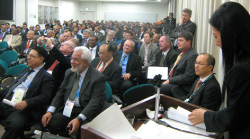 All eyes on stage for the Official Opening | 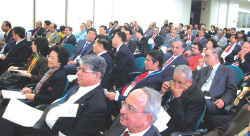 A section of the AAS delegates in YKC |
 8 member team who drafted the 8th Yokohama Resolution
Group G Meeting on “Strengthening AAS Network” | 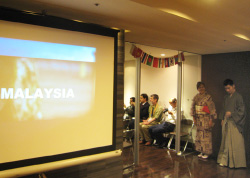 8Malaysian’ presentations as the Next Host of AAS World Convention |
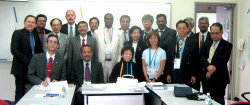 FOSAAS Group Meeting All the President Team including Mr. Yang, Ms Rachel & Ms. Melina from Malaysia | |

